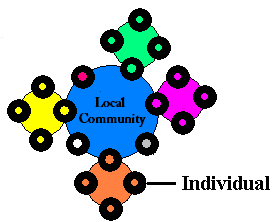Establishing a Standard of Morality within a Local Politic
A morality or value system of a community is established by the degree of punishments given for certain unacceptable conduct. The area in blue represents the local government of a community. It is their responsibility to create and enforce those laws that are a reflection of the 6th, 8th, and 9th Commandments. Their main responsibility is to promote and protect the safety of citizens in the politic from those who would do physical injury to them. The enforcement concerning violations of the other 7 Commandments are left to the members of the different religious groups according to their religious beliefs.
However, a religious group is never allowed to enforce a penalty upon a citizen within their group or community for unacceptable conduct concerning the seven Commanments listed above if it involves breaking one or more of the 3 Commandments enforced by the local political community representing the State. In other words, they can not take the law into their own hands.
To summarize, the diagram above illustrates the line that separates the function of the church from the function of the State. It is the imaginary line between the 3 Commandments enforced by the State and the 7 Commandments enforced by the citizens of the different religious and secular organizations that make up the local community. It is this line that must be recognized by all levels of government. It is the "Wall of Separation" found within every local politic. The liberty or individual rights of conscience of all citizens stop where the 6th, 8th, and 9th Commandments begin.
The People of the United States have never given any level of government in America the right to specify conduct that would interfere with the obligations a citizen might feel he has, according to his conscience, with his God concerning the 7 Commandments. Jefferson states the following:
"The error seems not sufficiently eradicated that the operations of the mind as well as the acts of the body are subject to the coercion of the laws. But our rulers can have no authority over such natural rights, only as we have submitted to them. The rights of conscience we never submitted, we could not submit. We are answerable for them to our God. The legitimate powers of government extend to such acts as are injurious to others." (Thomas Jefferson quoted from "Jefferson Himself" edited by Bernard Mayo, p.81, University Press of Virginia).
All Copyrights Reserved to Stephen L. Corrigan 2005
Page 3

